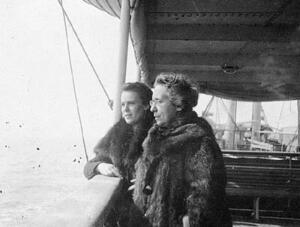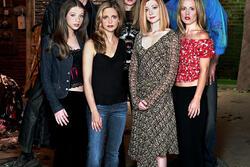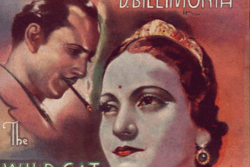Make America Great Again
I’ll never forget the time my downstairs neighbor confronted me about the clacking sounds emanating from my apartment. When I explained that they were the sounds of me using a typewriter, he responded, snotty as can be, “What is this, the past?”
Guilty as charged, downstairs-neighbor-dude: I love the past. I have not one but three typewriters. I had a penchant for corsets in high school and now will dress as a flapper any chance I get. I can’t stop reading about the Romanovs, or about 1920s Berlin when life was a cabaret, or about those secretly tawdry Victorians. Since starting as Social Media Manager at JWA I’ve been fascinated by the radical women of the early twentieth century and I would basically give anything to attend one of these salons or to meet a badass lady journalist of yore.
But sometimes when I talk about my love for the past, I receive a critique from well-meaning progressive folks. “Emily,” they say, “when you say you love the past, you mean you love learning about the past, but it’s not very progressive of you to say that you would want to live there! After all, in the past, women and people of color had no rights, and also people died super young of preventable diseases! Not like now!”
I know that these folks mean well. They are trying to caution me against inadvertently embracing the “Make America Great Again” narrative, which propagates the idea that there was some time and place in history––probably in the suburbs in 1955, for a small segment of white culture––in which America was better than it was now. The progressive folks are cautioning me against falling into that destructive narrative, which either willfully ignores or gleefully embraces the fact that women, LGBTs and people of color had fewer rights in the 1950s, which obfuscates the fact that for many groups and demographics, America has never been great.
I agree that the “Make America Great Again” narrative is horribly flawed––and I also think the progressives’ well-meaning blanket criticism of love for the past is wrong. It stems from the “progress narrative,” which is basically the idea that as time goes by, economies grow, technology advances, people become more enlightened, and societies improve in all realms. By this logic, America was automatically a worse country to live in a century ago; media produced three decades ago was automatically less inclusive than today’s media: and women ten years ago automatically had fewer rights and access to opportunities. According to the progress narrative, people of the past are quaint rubes at best and violent, reactionary maniacs at worst. It implies that from here, things can only improve.
The problem with the progress narrative is twofold. First, it stems from an oversimplification of political and social history. To be fair, this problem is exacerbated by the way we teach history in schools and the way most people consume history as adults. Sure, if you only dabble in the subject at the flash-cards-for-the-AP-exam level, you’ll be left thinking that the past was a series of wars run by white dudes. But what about social history? Take a gander at this video made in honor of 50/50 Day, a holiday back in May dedicated to gender equality. The film is a charmingly kitschy reminder that women have contributed to our world across all sectors of society throughout history. But you don’t even have to go to a different website to learn about that: the most cursory perusal of JWA’s archive demonstrates that women have always contributed to science, philosophy, art, politics, world events. It also demonstrates that the people of the past aren’t automatically less enlightened than we are. Case in point: Emma Goldman, she of the anarchy and birth control and free love and disdain for Vladimir Lenin, was more badass and radical than we will ever be.
The bigger problem with the progress narrative, though, is that believing in it absolves us of responsibility because it implies that no matter what we do, the world will just keep getting better. Students of history know this isn’t true. I’d much rather be a woman in the 1920s––newly able to vote and have a career, wearing comfortable clothing for the first time, participating in secret collectives with my friends to help me access abortion and birth control––than in the 1950s, with its regressive attitudes towards women’s roles, its deification of housewives, and its dangerous attitudes towards abortions (although even the 1950s were more complex than progressive and conservative depictions of them would have us believe; think of the Civil Rights movement, for goodness’ sakes.) You know where I’m going with this. Today, in this year of our lord 2017, abortion laws are regressing in many states and people of color are still not safe from police in America. We’re so proud that we’ve vanquished so many preventable diseases with modern medicine––but good luck getting access to it.
It’s not fair to ourselves or to our ancestors to write them off as a bunch of unenlightened rubes, to paint all women and people of color and LGBTs of the past as victims who never did anything but live under the boot of oppression, and to assume that everything is automatically better now. Someday my grandchildren might well look back and say they’d rather be a woman in 2000 than in 2020. I hope this doesn’t happen, but it’s looking more and more likely. Instead of relying on a simplistic historical paradigm that reassures us that everything will be okay, we need to fight for the society we want, for the rights we deserve, and for the world we want to see. And maybe if we need inspiration on how to do that, we can even look to the past.







